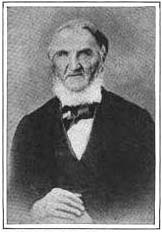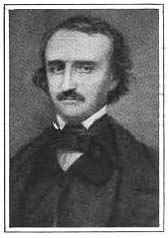∞∞∞∞∞∞∞
A PROHIBITIONIST SHAKES DICE WITH POE
BY THEODORE PEASE STEARNS
[column 1:]
WHEN Poe was attending the University of Virginia, at Charlottesville, it fell to the lot of my great-uncle, Peter Pindar Pease, to make his acquaintance. Pease afterwards met the poet again in Boston, at a time when his biographers seem to have lost track of Poe, and later met him again in New York.
It seems a pity that this companionship with this gifted genius should have fallen to the lot of as unsympathetic a person as my late kinsman. Indeed, the old gentleman never attached any importance to his association with Poe, and it was only by persistent inquiry that, my own uncle, Judge Harlow Pease, drew from his Uncle Peter the facts here presented just as the Judge passed them on to me. Had it not been for the latter's intense interest in Poe and his tireless curiosity, these interesting sidelights on several phases of the character and activities of Poe might never have been preserved.
Peter Pease was a stanch prohibitionist, and he believed Poe to be dissolute. He was a deacon in his church at Oberlin, Ohio (a determined pillar),and he regarded Poe as an outcast. Furthermore, old Deacon Pease was deeply interested in the “Underground Railway” before the war, and he assumed Poe to be a Southerner. Finally, the old gentleman cared nothing for any poetry outside his hymn-book, and therefore the entire scheme of Edgar Allan Poe's history and genius was without value to him.
SHAKING DICE FOR HOGARTH
As a boy old Pease was apprenticed to an itinerant saddler, Hermann Tucker by name, and shortly before the early ’30s arrived at Charlottesville, Virginia, where the worthy harness-maker opened a shop, and my great-uncle became his assistant.

PETER PINDAR PEASE, DEACON AND ABOLITIONIST, WHO AS A YOUTH SHOOK DICE WITH POE FOR A COPY OF HOGARTH'S PRINT'S
Trade was pretty brisk, and soon the little shop expanded into a sort of curio store filled with second-hand articles, including a library which had fallen under [column 2:] the auctioneer's hammer in order to satisfy a plantation debt and so came into the possession of Tucker. Among these books was a rare edition of Hogarth's prints, and this work the young assistant resolved to purchase on the installment plan from his employer.
Two small payments had been made when Poe, then attending the college there, happened into the shop one day, noticed the book, and desired to buy it. Upon Tucker's telling Poe that his clerk was attempting to purchase the work out of his meager earnings, the poet asked to be made known to my great-uncle, and thus their acquaintanceship began.
Poe immediately invited young Peter up to his room, asking him to bring the Hogarth along with him that they might look it over together, and the invitation was accepted.
Next evening the call was made, and after some parley Poe suggested that they gamble for the book, agreeing to pay Peter the full price which Tucker asked in case he lost. If Peter lost, he was to continue paying off the debt to Tucker and Poe was to keep the Hogarth. My great-uncle had been brought up to fear the devil and all his works with Calvinistic severity, but he resolved to take the chance of getting the book for nothing, so the dice were thrown.
Poe lost, and promptly paid over the money. Whatever became of the Hogarth I do not know. It is certainly not in the Pease family library and Peter probably sold it This incident occurred some time in May, 1826, as nearly as the old Deacon remembered it.
LIVING UNDER AN ASSUMED NAME
In July of the same year young Pease separated from his employer and returned to New England, settling in Boston, where he was again to meet Poe, though under vastly different circumstances. Poe left the University in December of 1826, and, breaking with his foster-father, Mr. Allan, started out to seek his fortune, full of hopes and with supreme confidence in his genius, but knowing absolutely nothing of the world.
It was while unloading a dray of hides on the water-front one Mustering March afternoon that my great-uncle recognized in a pale, rather stoop-shouldered clerk, emerging from a mercantile house hard by, his former acquaintance who had diced with him unsuccessfully in Virginia a year before. He was about to hail Poe when the latter, catching sight of him, turned away and hastily disappeared around the corner.

EDGAR ALLAN POE
Thinking that Poe did not care to renew the friendship, Pease returned to his work, but when he had finished and was starting homeward, there was Poe waiting for him some distance down the street. He was very shabbily appareled.
Pease hailed him, but Poe hurriedly pushed him into an alleyway and begged him not to speak his name aloud, giving for his reason that “he had left home to seek his fortune, and until he had hit it hard he preferred to remain incognito.”
As my great-uncle recounted it to Judge Pease: “He (Poe) told me that he had clerked for two months in a wholesale [column 3:] merchandise house on the water-front at a very small salary, the most of which he had been too proud to ask for, and his employer, taking advantage of this pride ana being a man of brutal and unscrupulous character, the boy was easily done out of most of the money which he had earned.
“His landlady, too, was a woman of no attainments, and had no patience with a boarder who sat up nights writing on paper which he could not afterward sell. She soon turned him into the street
“He then tried literary work, but failed to obtain employment on any of the large journals. Finally he secured work in the office of an obscure paper as market reporter; but, the proprietor being a man of shady reputation, the office soon got into debt, and soon after Poe joined it the paper stopped publication.
“He then told me that he was resolved to enlist in the army, for his resources were utterly exhausted, and he was determined not to write to former friends for help. I believe he remained in Boston seven months altogether.”
As is well known, Poe did enlist in the army in May, 1827, and served for two years.
POE'S PLAN TO GO WEST
Peter Pease did not see the poet again until 1831, when they met in New York, where Poe had gone, he said, to secure the publication of a book of his poems by Harpers. He claimed, almost boisterously, that he had “hit it hard” (evidently a favorite expression with him), meaning that his fortune was made. He told Pease that he was living in the vicinity of Madison Square, that he loved to walk beneath the elm trees there, and invited Pease to go with him for a refreshment. But my great-uncle was in a hurry to catch the boat for Amboy, so, after a short conversation, they shook hands and parted.
To his nephew, Harlow, the old deacon frequently mentioned a Mr. E. M. Murdoch, who was a one-time friend of his living near Cincinnati, where the suburb of Delhi is now located, and with whom he had “Underground Railway” interests. Murdock was introduced to Poe in Philadelphia [page 26:] at the time tire poet wag editor of “Graham's Magazine.” Upon learning that Munlock was from the West, Poe was all attention and asked about the literary outlook there, at the same time mentioning that he had friends in the Western Reserve and that he was thinking of locating out there.
Muruock promptly discouraged Poe, and, meeting him some time later, asked him why he had desired to make a change, since he was doing so well.
“That is just the reason,” answered Poe. “I was doing so well here I thought I could do better.”
Murdock told my great-uncle that Poe had “heart failure” at that time (winter of 1840-41), and this is probably the illness so often spoken of by Poe's biographers as “undefined.”
THE SARATOGA TRIP
In the summer of 1843 Poe visited Saratoga in an effort to recuperate his own health, but more especially to arrange for treatment for his wife, Virginia, whose health was rapidly failing.
“In order to make this trip,” said Murdock to my great-uncle, “Poe cast about him for means by which the expense of the journey might be met without crippling his already straitened circumstances. He was so far fortunate as to secure a small loan and the acceptance by a New York magazine of one of his stories submitted many months before, the fate of which he had long given up as hopeless but which now came into port unexpectedly and at a most opportune moment.
“His trip resulted in nothing satisfactory. At Saratoga he discovered that his means would not begin to warrant the moving of Virginia, if, indeed, she could weather the trip at all. His own health was not benefited [[benefitted]], and after only a few days of discouraging inquiry he returned to Philadelphia utterly cast down in spirit over this additional disappointment, from which he was long in rallying,” concluded the informant.
SOME RANDOM NOTES
At the time of the Boston meeting Poe, though very poorly clad, was scrupulously neat. He seemed to be very tired, so my great-uncle related, “as though from loss of sleep.”
When he met him in New York, Peter Pease noticed a peculiar characteristic of Poe's, and this was that while walking he held his fist behind his back, rubbing the thumb slowly back and forth over the index finger. This he noticed at once, and it struck my great-uncle as being “very peculiar.”
Referring to their previous talk in Boston, the Deacon said that Poe frowned at the thought of his hard experiences in that city five years back, and admitted that he felt desperate enough to “do anything except cut his throat.’
Poe's biographers are in doubt as to his having gone to New York in 1831. He was certainly there according to this.
The recent death of Judge Harlow Pease, of Watertown, Wisconsin, enables me to publish these facts about Edgar Allan Poe.
It was one of my uncle's peculiarities not to allow his name to be used in connection with any published memoir. He said to me with decision: “You may print what I have told you, Theodore, after I am dead. I have no objection to that.”
∞∞∞∞∞∞∞
Notes:
If we accept this story, the edition of Hogarth may have been the James Heath restrike printing of the original plates, London: Baldwin and Cradock, 1822. This is a very large volume, measuring 28 7/8 inches x 10 1/2 inches x 2 11/16 inches, with 119 plates.
∞∞∞∞∞∞∞
[S:0 - OUTLOOK, 1920] - Edgar Allan Poe Society of Baltimore - A Poe Bookshelf - A Prohibitionist Shakes Dice with Poe (T. P. Stearns, 1920)